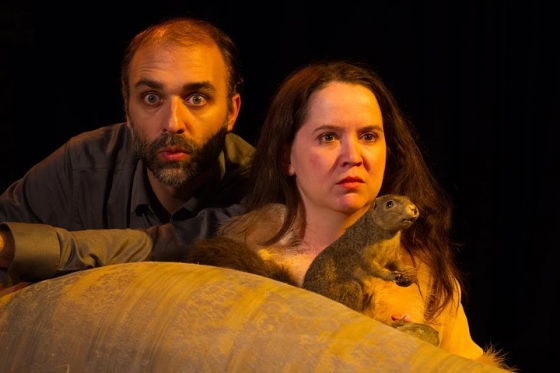
For much of Due to Events, the terrific and very funny new play by Jean Ann Douglass and Eric John Meyer, the conversational partners available to protagonist Hero (Anne Gridley) are one living animal and one dead one. Hero, a writer whose work concerns "the future," has been arrested and confined by order of the authorities to her one-room apartment while she awaits a trial with no set date, allowed to communicate with representatives of those authorities only by speaking into a taxidermies squirrel. Upon its arrival, this squirrel catches the interest of Hero's Cat (Laura Campbell), the only living thing that she has contact with aside from her dedicated if unconventional Lawyer (Ben Beckley).
Hero's house arrest and hypothetically pending court date call to mind people made to disappear by regimes such as those of the Soviet Union and apartheid South Africa. With its direct invocation of Orwell's 1984, Due to Events offers an absurdist take on totalitarianism and repression. However, the sociopolitical is not its only, or even primary, thematic focus. The standard admonition to turn off cell phones as the play begins modulates into a meditation on the individual subject's experience, a concern that threads throughout the play. Due to Events plays with questions of perspective, how it affects what is being perceived (which in turn affects the subject and her perceptions) and what happens as a result of shifts in perspective, whether because of conscious decision or from causes outside of one’s control. How does the Cat, for instance, perceive her existence in the space of this apartment with this other living being? What, Hero asks, if she thinks of her desk as the reflection of its reflection in the large standing mirror? The initially prickly Hero and the Cat begin with radically different subject positions and perspectives, but come to view one another and themselves differently by the end. (In a parallel, Hero and the Lawyer spend a lot of time trying not to acknowledge any change, actual or potential, in their professional relationship.)
In addition to Orwell, Due to Events invokes Paul Bowles, whose most well-known novel, The Sheltering Sky, deals with breakdowns and fundamental reconfigurations of the selves that his characters are attempting to define through travel. While Hero cannot travel in the traditional sense (that is left to her Lawyer, acting under her instructions), we are all always, as the play points out, undergoing an inexorable spatiotemporal journey, and both Hero and the apartment’s previous tenant symbolically assemble, in different ways, new texts from fragments of existing ones.
The play and its questions are animated by great work by the cast. If there were an award for Best Onstage Portrayal of a Cat, Laura Campbell would win handily (at one point, she even reacted in character when an audience member dropped a program). Anne Gridley creates a memorably unique Hero, abrasive at first but always a Hero to her cat (and, it seems, to her Lawyer), and Ben Beckley is compelling as the Lawyer losing his polish while attempting to follow in the footsteps of a person, maybe named Dan, who always stayed in the same rooms at the same hotels as he traveled from one hot climate to another. David Skeist is excellent and engaging as the Voiceover guy (he has a perfect voice for voiceovers), the dryly absurd government functionary (or perhaps functionaries) who occasionally shows up in Hero’s apartment, and the various service workers whom the lawyer meets on his travels. The show makes effective use of the entire space of the Brick, arranging the audience’s seats around the periphery and thereby locating them within the apartment to which Hero is confined, while "elsewhere" plays out in its own curtained alcove, which becomes more like a proscenium stage and connects to metatheatrical moments about putting on and watching plays, even while the play excels at creating its own world with a specific atmosphere and rhythms.
Douglass and Meyer's play asks some big existential questions, like how you experience what is around you, and how your experience of it changes it, and it does so while being very, very funny and entertaining. If elements that would be at home in Kafka, Stoppard, and perhaps even Donnie Darko filtered through a cat with a hobby in jazzy performance art sounds like a fun time, it is. Due to Events is a subjective experience that you should definitely have for yourself. - Leah Richards & John Ziegler
